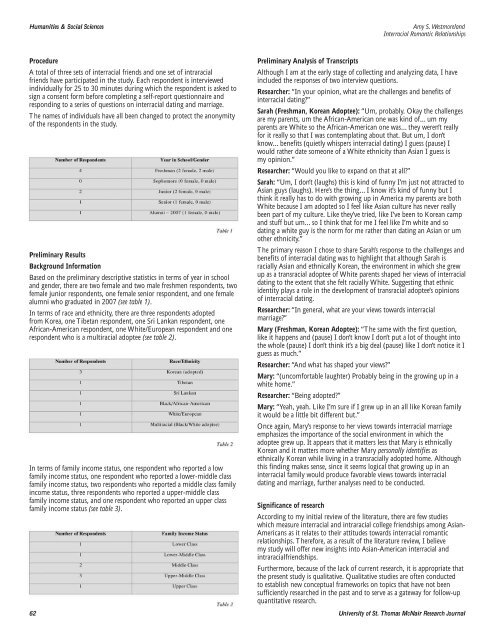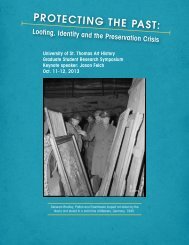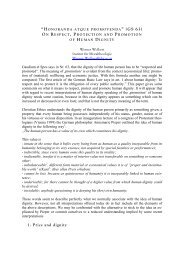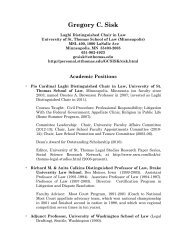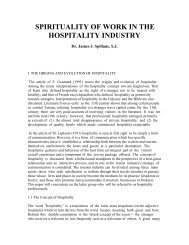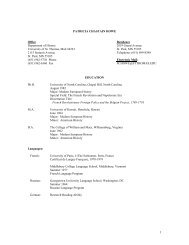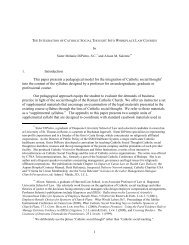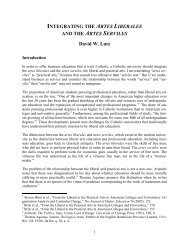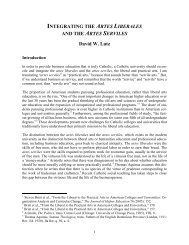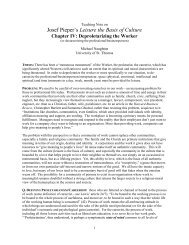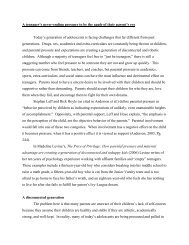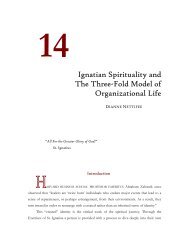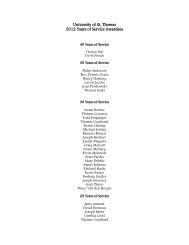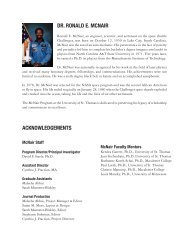McNair Research Journal - University of St. Thomas
McNair Research Journal - University of St. Thomas
McNair Research Journal - University of St. Thomas
You also want an ePaper? Increase the reach of your titles
YUMPU automatically turns print PDFs into web optimized ePapers that Google loves.
Humanities & Social Sciences<br />
Procedure<br />
A total <strong>of</strong> three sets <strong>of</strong> interracial friends and one set <strong>of</strong> intraracial<br />
friends have participated in the study. Each respondent is interviewed<br />
individually for 25 to 30 minutes during which the respondent is asked to<br />
sign a consent form before completing a self-report questionnaire and<br />
responding to a series <strong>of</strong> questions on interracial dating and marriage.<br />
The names <strong>of</strong> individuals have all been changed to protect the anonymity<br />
<strong>of</strong> the respondents in the study.<br />
Preliminary Results<br />
Background Information<br />
Based on the preliminary descriptive statistics in terms <strong>of</strong> year in school<br />
and gender, there are two female and two male freshmen respondents, two<br />
female junior respondents, one female senior respondent, and one female<br />
alumni who graduated in 2007 (see table 1).<br />
In terms <strong>of</strong> race and ethnicity, there are three respondents adopted<br />
from Korea, one Tibetan respondent, one Sri Lankan respondent, one<br />
African-American respondent, one White/European respondent and one<br />
respondent who is a multiracial adoptee (see table 2).<br />
In terms <strong>of</strong> family income status, one respondent who reported a low<br />
family income status, one respondent who reported a lower-middle class<br />
family income status, two respondents who reported a middle class family<br />
income status, three respondents who reported a upper-middle class<br />
family income status, and one respondent who reported an upper class<br />
family income status (see table 3).<br />
Amy S. Westmoreland<br />
Interracial Romantic Relationships<br />
Preliminary Analysis <strong>of</strong> Transcripts<br />
Although I am at the early stage <strong>of</strong> collecting and analyzing data, I have<br />
included the responses <strong>of</strong> two interview questions.<br />
<strong>Research</strong>er: “In your opinion, what are the challenges and benefits <strong>of</strong><br />
interracial dating?”<br />
Sarah (Freshman, Korean Adoptee): “Um, probably. Okay the challenges<br />
are my parents, um the African-American one was kind <strong>of</strong>…um my<br />
parents are White so the African-American one was…they weren’t really<br />
for it really so that I was contemplating about that. But um, I don’t<br />
know…benefits (quietly whispers interracial dating) I guess (pause) I<br />
would rather date someone <strong>of</strong> a White ethnicity than Asian I guess is<br />
my opinion.”<br />
<strong>Research</strong>er: “Would you like to expand on that at all?”<br />
Sarah: “Um, I don’t (laughs) this is kind <strong>of</strong> funny I’m just not attracted to<br />
Asian guys (laughs). Here’s the thing…I know it’s kind <strong>of</strong> funny but I<br />
think it really has to do with growing up in America my parents are both<br />
White because I am adopted so I feel like Asian culture has never really<br />
been part <strong>of</strong> my culture. Like they’ve tried, like I’ve been to Korean camp<br />
and stuff but um…so I think that for me I feel like I’m white and so<br />
dating a white guy is the norm for me rather than dating an Asian or um<br />
other ethnicity.”<br />
The primary reason I chose to share Sarah’s response to the challenges and<br />
benefits <strong>of</strong> interracial dating was to highlight that although Sarah is<br />
racially Asian and ethnically Korean, the environment in which she grew<br />
up as a transracial adoptee <strong>of</strong> White parents shaped her views <strong>of</strong> interracial<br />
dating to the extent that she felt racially White. Suggesting that ethnic<br />
identity plays a role in the development <strong>of</strong> transracial adoptee’s opinions<br />
<strong>of</strong> interracial dating.<br />
<strong>Research</strong>er: “In general, what are your views towards interracial<br />
marriage?”<br />
Mary (Freshman, Korean Adoptee): “The same with the first question,<br />
like it happens and (pause) I don’t know I don’t put a lot <strong>of</strong> thought into<br />
the whole (pause) I don’t think it’s a big deal (pause) like I don’t notice it I<br />
guess as much.”<br />
<strong>Research</strong>er: “And what has shaped your views?”<br />
Mary: “(uncomfortable laughter) Probably being in the growing up in a<br />
white home.”<br />
<strong>Research</strong>er: “Being adopted?”<br />
Mary: “Yeah, yeah. Like I’m sure if I grew up in an all like Korean family<br />
it would be a little bit different but.”<br />
Once again, Mary’s response to her views towards interracial marriage<br />
emphasizes the importance <strong>of</strong> the social environment in which the<br />
adoptee grew up. It appears that it matters less that Mary is ethnically<br />
Korean and it matters more whether Mary personally identifies as<br />
ethnically Korean while living in a transracially adopted home. Although<br />
this finding makes sense, since it seems logical that growing up in an<br />
interracial family would produce favorable views towards interracial<br />
dating and marriage, further analyses need to be conducted.<br />
Significance <strong>of</strong> research<br />
According to my initial review <strong>of</strong> the literature, there are few studies<br />
which measure interracial and intraracial college friendships among Asian-<br />
Americans as it relates to their attitudes towards interracial romantic<br />
relationships. Therefore, as a result <strong>of</strong> the literature review, I believe<br />
my study will <strong>of</strong>fer new insights into Asian-American interracial and<br />
intraracialfriendships.<br />
Furthermore, because <strong>of</strong> the lack <strong>of</strong> current research, it is appropriate that<br />
the present study is qualitative. Qualitative studies are <strong>of</strong>ten conducted<br />
to establish new conceptual frameworks on topics that have not been<br />
sufficiently researched in the past and to serve as a gateway for follow-up<br />
quantitative research.<br />
62 <strong>University</strong> <strong>of</strong> <strong>St</strong>. <strong>Thomas</strong> <strong>McNair</strong> <strong>Research</strong> <strong>Journal</strong>


